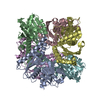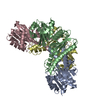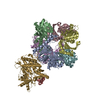+ Open data
Open data
- Basic information
Basic information
| Entry |  | |||||||||
|---|---|---|---|---|---|---|---|---|---|---|
| Title | Mycobacterium tuberculosis CoaX Homohexamer | |||||||||
 Map data Map data | ||||||||||
 Sample Sample |
| |||||||||
 Keywords Keywords | Pantothenate Kinase Isoform / CYTOSOLIC PROTEIN | |||||||||
| Function / homology |  Function and homology information Function and homology informationpantothenate kinase / pantothenate kinase activity / coenzyme A biosynthetic process / ATP binding / metal ion binding / cytoplasm Similarity search - Function | |||||||||
| Biological species |  | |||||||||
| Method | single particle reconstruction / cryo EM / Resolution: 2.59 Å | |||||||||
 Authors Authors | Chen J / Ekiert DC / Bhabha G | |||||||||
| Funding support |  United States, 2 items United States, 2 items
| |||||||||
 Citation Citation |  Journal: Proc Natl Acad Sci U S A / Year: 2024 Journal: Proc Natl Acad Sci U S A / Year: 2024Title: Identification of a depupylation regulator for an essential enzyme in . Authors: Shoshanna C Kahne / Jin Hee Yoo / James Chen / Kehilwe Nakedi / Lakshminarayan M Iyer / Gregory Putzel / Nora M Samhadaneh / Alejandro Pironti / L Aravind / Damian C Ekiert / Gira Bhabha / ...Authors: Shoshanna C Kahne / Jin Hee Yoo / James Chen / Kehilwe Nakedi / Lakshminarayan M Iyer / Gregory Putzel / Nora M Samhadaneh / Alejandro Pironti / L Aravind / Damian C Ekiert / Gira Bhabha / Kyu Y Rhee / K Heran Darwin /  Abstract: In , proteins that are posttranslationally modified with a prokaryotic ubiquitin-like protein (Pup) can be degraded by bacterial proteasomes. A single Pup-ligase and depupylase shape the pupylome, ...In , proteins that are posttranslationally modified with a prokaryotic ubiquitin-like protein (Pup) can be degraded by bacterial proteasomes. A single Pup-ligase and depupylase shape the pupylome, but the mechanisms regulating their substrate specificity are incompletely understood. Here, we identified a depupylation regulator, a protein called CoaX, through its copurification with the depupylase Dop. CoaX is a pseudopantothenate kinase that showed evidence of binding to pantothenate, an essential nutrient synthesizes, but not its phosphorylation. In a ∆ mutant, pantothenate synthesis enzymes including PanB, a substrate of the Pup-proteasome system (PPS), were more abundant than in the parental strain. In vitro, CoaX specifically accelerated depupylation of Pup~PanB, while addition of pantothenate inhibited this reaction. In culture, media supplementation with pantothenate decreased PanB levels, which required CoaX. Collectively, we propose CoaX regulates PanB abundance in response to pantothenate levels by modulating its vulnerability to proteolysis by proteasomes. | |||||||||
| History |
|
- Structure visualization
Structure visualization
| Supplemental images |
|---|
- Downloads & links
Downloads & links
-EMDB archive
| Map data |  emd_44303.map.gz emd_44303.map.gz | 59.8 MB |  EMDB map data format EMDB map data format | |
|---|---|---|---|---|
| Header (meta data) |  emd-44303-v30.xml emd-44303-v30.xml emd-44303.xml emd-44303.xml | 18.6 KB 18.6 KB | Display Display |  EMDB header EMDB header |
| FSC (resolution estimation) |  emd_44303_fsc.xml emd_44303_fsc.xml | 8.4 KB | Display |  FSC data file FSC data file |
| Images |  emd_44303.png emd_44303.png | 87.6 KB | ||
| Filedesc metadata |  emd-44303.cif.gz emd-44303.cif.gz | 6.3 KB | ||
| Others |  emd_44303_half_map_1.map.gz emd_44303_half_map_1.map.gz emd_44303_half_map_2.map.gz emd_44303_half_map_2.map.gz | 59.5 MB 59.5 MB | ||
| Archive directory |  http://ftp.pdbj.org/pub/emdb/structures/EMD-44303 http://ftp.pdbj.org/pub/emdb/structures/EMD-44303 ftp://ftp.pdbj.org/pub/emdb/structures/EMD-44303 ftp://ftp.pdbj.org/pub/emdb/structures/EMD-44303 | HTTPS FTP |
-Validation report
| Summary document |  emd_44303_validation.pdf.gz emd_44303_validation.pdf.gz | 858.6 KB | Display |  EMDB validaton report EMDB validaton report |
|---|---|---|---|---|
| Full document |  emd_44303_full_validation.pdf.gz emd_44303_full_validation.pdf.gz | 858.2 KB | Display | |
| Data in XML |  emd_44303_validation.xml.gz emd_44303_validation.xml.gz | 16.5 KB | Display | |
| Data in CIF |  emd_44303_validation.cif.gz emd_44303_validation.cif.gz | 21.5 KB | Display | |
| Arichive directory |  https://ftp.pdbj.org/pub/emdb/validation_reports/EMD-44303 https://ftp.pdbj.org/pub/emdb/validation_reports/EMD-44303 ftp://ftp.pdbj.org/pub/emdb/validation_reports/EMD-44303 ftp://ftp.pdbj.org/pub/emdb/validation_reports/EMD-44303 | HTTPS FTP |
-Related structure data
| Related structure data |  9b78MC  9b79C  9ckuC M: atomic model generated by this map C: citing same article ( |
|---|---|
| Similar structure data | Similarity search - Function & homology  F&H Search F&H Search |
- Links
Links
| EMDB pages |  EMDB (EBI/PDBe) / EMDB (EBI/PDBe) /  EMDataResource EMDataResource |
|---|
- Map
Map
| File |  Download / File: emd_44303.map.gz / Format: CCP4 / Size: 64 MB / Type: IMAGE STORED AS FLOATING POINT NUMBER (4 BYTES) Download / File: emd_44303.map.gz / Format: CCP4 / Size: 64 MB / Type: IMAGE STORED AS FLOATING POINT NUMBER (4 BYTES) | ||||||||||||||||||||||||||||||||||||
|---|---|---|---|---|---|---|---|---|---|---|---|---|---|---|---|---|---|---|---|---|---|---|---|---|---|---|---|---|---|---|---|---|---|---|---|---|---|
| Projections & slices | Image control
Images are generated by Spider. | ||||||||||||||||||||||||||||||||||||
| Voxel size | X=Y=Z: 0.826 Å | ||||||||||||||||||||||||||||||||||||
| Density |
| ||||||||||||||||||||||||||||||||||||
| Symmetry | Space group: 1 | ||||||||||||||||||||||||||||||||||||
| Details | EMDB XML:
|
-Supplemental data
-Half map: #1
| File | emd_44303_half_map_1.map | ||||||||||||
|---|---|---|---|---|---|---|---|---|---|---|---|---|---|
| Projections & Slices |
| ||||||||||||
| Density Histograms |
-Half map: #2
| File | emd_44303_half_map_2.map | ||||||||||||
|---|---|---|---|---|---|---|---|---|---|---|---|---|---|
| Projections & Slices |
| ||||||||||||
| Density Histograms |
- Sample components
Sample components
-Entire : Homohexameric assembly of M. tuberculosis CoaX
| Entire | Name: Homohexameric assembly of M. tuberculosis CoaX |
|---|---|
| Components |
|
-Supramolecule #1: Homohexameric assembly of M. tuberculosis CoaX
| Supramolecule | Name: Homohexameric assembly of M. tuberculosis CoaX / type: complex / ID: 1 / Parent: 0 / Macromolecule list: all |
|---|---|
| Source (natural) | Organism:  |
-Macromolecule #1: Type III pantothenate kinase
| Macromolecule | Name: Type III pantothenate kinase / type: protein_or_peptide / ID: 1 / Number of copies: 6 / Enantiomer: LEVO / EC number: pantothenate kinase |
|---|---|
| Source (natural) | Organism:  |
| Molecular weight | Theoretical: 29.341678 KDa |
| Recombinant expression | Organism:  |
| Sequence | String: MLLAIDVRNT HTVVGLLSGM KEHAKVVQQW RIRTESEVTA DELALTIDGL IGEDSERLTG TAALSTVPSV LHEVRIMLDQ YWPSVPHVL IEPGVRTGIP LLVDNPKEVG ADRIVNCLAA YDRFRKAAIV VDFGSSICVD VVSAKGEFLG GAIAPGVQVS S DAAAARSA ...String: MLLAIDVRNT HTVVGLLSGM KEHAKVVQQW RIRTESEVTA DELALTIDGL IGEDSERLTG TAALSTVPSV LHEVRIMLDQ YWPSVPHVL IEPGVRTGIP LLVDNPKEVG ADRIVNCLAA YDRFRKAAIV VDFGSSICVD VVSAKGEFLG GAIAPGVQVS S DAAAARSA ALRRVELARP RSVVGKNTVE CMQAGAVFGF AGLVDGLVGR IREDVSGFSV DHDVAIVATG HTAPLLLPEL HT VDHYDQH LTLQGLRLVF ERNLEVQRGR LKTAR UniProtKB: Type III pantothenate kinase |
-Experimental details
-Structure determination
| Method | cryo EM |
|---|---|
 Processing Processing | single particle reconstruction |
| Aggregation state | particle |
- Sample preparation
Sample preparation
| Concentration | 0.1 mg/mL | ||||||||||||
|---|---|---|---|---|---|---|---|---|---|---|---|---|---|
| Buffer | pH: 8 Component:
| ||||||||||||
| Grid | Model: Quantifoil R2/2 / Material: COPPER / Mesh: 300 / Support film - Material: CARBON / Support film - topology: CONTINUOUS / Support film - Film thickness: 2 | ||||||||||||
| Vitrification | Cryogen name: ETHANE / Chamber humidity: 100 % / Chamber temperature: 298 K / Instrument: FEI VITROBOT MARK IV |
- Electron microscopy
Electron microscopy
| Microscope | FEI TITAN KRIOS |
|---|---|
| Specialist optics | Energy filter - Slit width: 20 eV |
| Image recording | Film or detector model: GATAN K3 (6k x 4k) / Number grids imaged: 1 / Number real images: 7913 / Average exposure time: 1.8 sec. / Average electron dose: 48.51 e/Å2 |
| Electron beam | Acceleration voltage: 300 kV / Electron source:  FIELD EMISSION GUN FIELD EMISSION GUN |
| Electron optics | Illumination mode: FLOOD BEAM / Imaging mode: BRIGHT FIELD / Cs: 2.7 mm / Nominal defocus max: 2.5 µm / Nominal defocus min: 0.8 µm / Nominal magnification: 105000 |
| Sample stage | Specimen holder model: FEI TITAN KRIOS AUTOGRID HOLDER / Cooling holder cryogen: NITROGEN |
| Experimental equipment |  Model: Titan Krios / Image courtesy: FEI Company |
 Movie
Movie Controller
Controller








 Z (Sec.)
Z (Sec.) Y (Row.)
Y (Row.) X (Col.)
X (Col.)






































